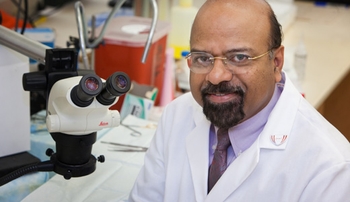At Thursday’s Innovation Awards Ceremony, Babu Padanilam, Ph.D., associate professor in the department of cellular and integrative physiology, was honored with UNeMed’s Most Promising New Invention Award.
 |
Babu Padanilam, Ph.D. |
Below, Dr. Padanilam discusses his invention, research and his experience with UNeMed.
Describe your research/invention in laymens term
Chronic kidney disease (CKD) is progressive, incurable and ultimately fatal. The disease affects 10 to 16 percent of the adult population in Asia, Australia, Europe and the U.S. Fibrosis is the final common pathway in CKD that leads to disease progression and ultimately end stage renal disease (ESRD). My research team has identified a molecular signaling pathway that instigates kidney fibrosis.
How does your research contribute to science/health care?
Our research is aimed at understanding the signaling pathways that lead to CKD and at the development of strategies to intervene in those pathways to treat CKD. Identification of a treatment strategy will have a tremendous impact on morbidity and mortality of CKD patients and the health care associated with CKD. The mortality among ESRD patients in the U.S., particularly those on dialysis, is about 20 percent and the associated health care cost has reached $30 billion per year.
How did UNeMed help you and what were you able to accomplish because of its support?
My interactions with UNeMed always have been cordial and supportive. Once we reported our invention, UNeMed representative Mr. Matthew Boehm took the necessary steps for technology transfer as well as in communicating with pharmaceutical companies to obtain novel pharmacological agents and other resources to further our research.